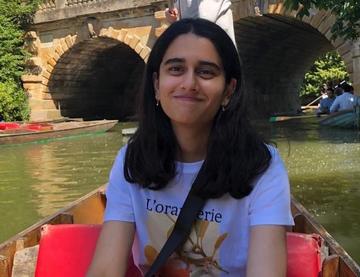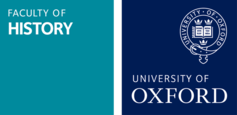Lessons from an interview with an Oxford Muslim
This piece is written by Janita Hussain, studying BA Ancient & Modern History at Keble College. Janita was one of the first interns on the Faculty’s Community History initiative, working on the collaborative project, ‘The History of Muslims in Oxford’ together with our community partner, Everyday Muslim. She shares some reflections on what conducting oral history research into the experiences of the local Muslim community meant to her, as a student with British-Pakistani heritage.

Lessons from an interview with an Oxford Muslim
As part of my work on the Oxford University History Faculty Community History project, I undertook research into the lives and experiences of Muslims in Oxford. In this blog post I summarise the experience and findings of one of my interviews. I was very grateful to be a part of this project as an intern since, as a history student, I have often been struck by the relative lack of sources and focus upon minority groups, including the Muslim community.
This interview was especially fascinating to me, as I am Muslim and come from a British Pakistani background. The stories shared with me are hence invaluable in helping not only to shape a database of information about the historically under-documented Muslim community in Oxford, but also in helping me to learn more about my personal history.
Relocation
The subject of my interview requested for her name to be kept anonymous in this blog post, for the sake of her privacy. She moved to Oxford when she was 17. She immigrated from Pakistan with her mother and siblings, to join her father who already had a job in London. I asked what this process was like – were they able to bring many things with them? Was it difficult or upsetting? My interviewee explained that one of the most important things she brought with her was her collection of books, specifically those for personal rather than educational reading.
Her anecdotes helped to highlight how emotional such a big life change must have been for her and her family. My own grandparents, who have now passed away, also immigrated to the UK from Pakistan, and hearing about these experiences has helped me to greater understand the difficulties they must have faced in doing so. That the History Faculty is placing such importance upon a project in which immigrant experience is a focal point has been really refreshing, and a step in the right direction towards addressing under-representation in the field.
Early Difficulties
The initial weeks after moving to Oxford were very difficult for the interviewee. She noted that she went so far as to ask her father if she could move back to Pakistan, alone, because she found it so hard to leave her old life behind. She was particularly surprised by the nature of housing in the UK. Where in her hometown of Jhelum, it was common practice for homes to have large awnings and many rooms, this was not the case in Oxford – “I got pretty shocked when I saw the cars parked outside on the road and I was like why can’t they take them inside to their houses?”
There was also much less provision for Muslims in Oxford during the 1990s than there is today. There had been only one halal meat shop, and she noted the newness of having to check whether she was able to eat certain foods. Small details such as these can highlight the raw struggles involved in completely relocating to a different location and cannot always be captured by more general histories of South Asian migration in the last decades of the 20th century. In Pakistan, everything was halal, which is unsurprising given that it is a Muslim country. There was, however, a mosque nearby and this meant that male members of her family could pray the Friday Jummah prayer, for example. Since most of her wider family located to the UK, she also felt that they were able to keep alive the cultural and religious importance of events such as Eid. To me, gathering personal experiences such as these is hence invaluable, as it can shed light on human experiences which are often overlooked in mainstream history education.
Changes:
Many things have changed since the interviewee first came to Oxford from Pakistan as a teenager. She explains that there are now several places from which she can get halal food, both in the form of butchers’ and restaurants. Workplaces also make provision for Muslim employees if they ask for it, such as adjusting hours during the holy month of Ramadan and creating places for private prayer. Her own family’s celebrations have also evolved – she now celebrates events such as Christmas and Valentine’s Day, which she did not in Pakistan. She noted, interestingly, that these holidays have become commonly celebrated in Pakistan, too, since her youth.
Life in Pakistan:
My interviewee also discussed her past life in Pakistan, which was fascinating for me as I found it difficult to learn more about what life was like there, and how it is today. Religious education was integrated into mainstream education in Pakistan and continues to be today. Children take the subject Islamiat in school, which teaches them about the contents of the Qur’an and also elements of how to complete obligatory prayers. Children also learned about religion by observing their parents, who could practically demonstrate the things they were learning in theory at school. I asked the interviewee whether her children were having a similar experience in terms of religious education – or did she feel this atmosphere was somewhat lost in Oxford? She explained that they attended classes at the local Mosque, which gave them this education, rather than it being taught at school.
Conducting this interview was very insightful, and it can be seen that things have changed a lot for the Muslim community in Oxford since the 1990s. It was good to hear that many cultural and religious practices have been kept alive, even if in ways which differ slightly to how they may have been in Pakistan.
It is often disheartening, as a history student from a minority background, for syllabi to have such an intense focus upon Euro-centric and specifically Caucasian histories. Being an intern on this project has allowed me to expand my research focus into new fields which reflect my own identity. In doing so, I have also gained a useful understanding of the process of primary research, which I may not otherwise have experienced until at least the beginning of my thesis study. I was thrilled to use this opportunity to remind myself that history is not confined to certain locations, ethnicities or religions, and to see elements of my own personal history be given a platform.


